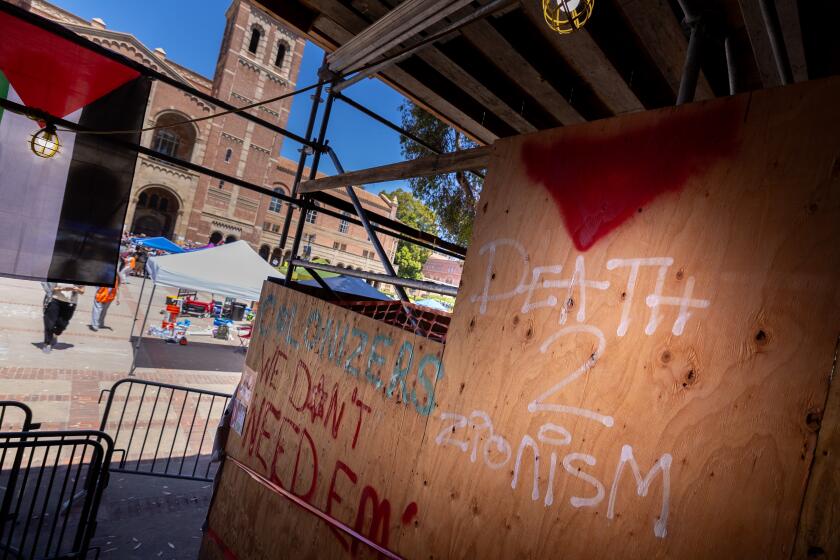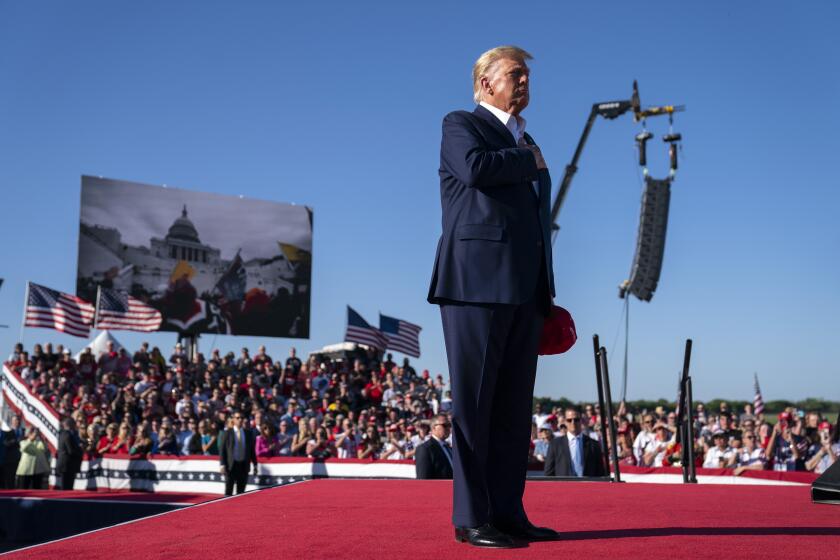U.S. ‘Lawmen’ Ride Into Town
The law came to town Thursday, American-style. After staying in the shadows since the surrender of the Taliban a week ago, patrols of U.S. Army troops for the first time made their presence felt to the people of the Taliban’s spiritual capital.
Instead of being stoned or shot at by the crowds that materialized wherever they went, the desert-camouflaged soldiers--no rank, no insignia, no names--received mostly smiles, waves and an occasional thumbs-up. The soldiers’ mission was a simple but vital one: bringing security to the new Afghanistan that the United States hopes will emerge in the wake of the Taliban’s defeat.
Like Wyatt Earp in Tombstone, Ariz., the provisional government being formed here under Pushtun leader Hamid Karzai and Kandahar governor Gul Agha Shirzai wants the city’s gunmen to give up their weapons so that ordinary people feel safe to go about their lives.
The U.S. soldiers, who seem to be working hand-in-glove with Karzai’s people, were out on the streets to help achieve that goal.
In a display of confidence that bordered on cocky, they rode slowly on the back of a new-looking white Chevrolet pickup along Kandahar’s main thoroughfare, and along the dusty alleys of poor, ramshackle sections of the city--the teeming places where the radical Islamic movement took root and drew its strength.
For protection, they packed M-4 assault rifles with scopes and laser range-finders, grenade launchers and holstered Beretta sidearms. They had an Afghan interpreter and two pickup trucks of Afghan fighters escorting them, helping to navigate the confusing streets.
Alighting at a crossroads in the district of Sima Pol, a lanky, bearded, sandy-haired soldier who seemed to be in charge of a midday patrol leaned into the face of a turquoise-robed local Afghan commander and gave instructions for dealing with a truckload of men that had just been stopped.
“If their leader is loyal to one of the good guys, they can keep their weapons,” he barked. “If not, they’re coming with us.”
By “the good guys,” the soldier explained to his interpreter, he meant Karzai, Shirzai or Kandahar province’s military commander, Mullah Naquibullah. In the course of an hour, the patrol stopped at three locations to tell local fighters where they ought to set up checkpoints and confiscate guns.
The checkpoints also are to be used to snare any Taliban leaders or die-hard foreign fighters who may still be in the vicinity. “They have hidden themselves. Some of them have died, and the rest of them, they are hidden,” said Naquibullah, an Afghan commander (not related to the province’s military chief) who was working with the U.S. troops. He said his forces would conduct house-to-house searches to find weapons.
The Americans, he said, could help track down the hundreds of non-Afghan fighters who slipped into the desert after the Taliban surrendered. “If the Americans were not here, Al Qaeda would not have been gone for 20 years,” he said. “We could not have done this ourselves.”
A 55-year-old man watching the scene said he was glad to see the U.S. troops taking the lead to bring more security to the area.
“Whoever wants to bring peace and stability is welcome,” Ustaz Mohammed Bashir said. “The Americans do not stop us from offering prayers, so this is fair. We are very happy they are collecting arms, because we are afraid. Looting has started--every day, every night people loot people, and it is not known who they are.”
Later in the day, two pickup loads of Army troops made their way down Kandahar’s main thoroughfare and through crowded bazaars, attracting large swarms as teams of American journalists maneuvered their own vehicles two abreast through traffic to photograph them.
It became even more like a scene from an improbable action film when the lead Army vehicle plowed into a motorcycle. After determining that the driver was not injured, the troops drove another half a mile and pulled over with a flat tire. A delighted crowd of young Afghan men pushed forward, grinning broadly at the soldiers’ misfortune.
As a grim-faced recruit held them at bay with his rifle, another one leaped out and repaired the tire. Then the troops piled back in and drove back down the highway, disappearing into the desert sunset. “You know, this is interference,” one young man, Abdul Kadir, said as they drove away.
“They have helped the Northern Alliance take all the power with the new government and make the Pushtun tribe become weak. They are interfering in our country. But if they can bring security inside this city, that would be a good thing.”
Security is what the new police commander wants to bring.
Zabit Mohammed Akram, in his second day on the job after being appointed by Shirzai, was holding court Thursday in security headquarters and willingly described his aims for the city to an American reporter. (Some of his associates who used to be with the Taliban appeared bemused at having a foreign “infidel” in their midst.)
“Right now we have 720 people for the security of Kandahar city, and only 80 to 90 uniforms,” he said. “We need them all in uniform as soon as possible to bring peace and security to Kandahar city.”
Akram said that in the last three days, his security forces had confiscated 3,000 weapons and dismantled 120 illegal checkpoints. They also secured the compounds of foreign nongovernmental organizations that had been occupied and looted by Taliban and Al Qaeda fighters before they fled the city. “Those organizations can come back and start work again as soon as possible,” he said. “We invite them and guarantee 100% no one will touch them. We need these organizations very badly, and we want them to come back and begin work.”
But taking weapons away from the civilian population may be harder than it sounds. After two decades of civil war, nearly everyone has firearms, and hardly anyone can think of a good reason to give them up.
In the district of Sarpoza Dorahi, a group of men sat lazily on the ground in front of a shop, all of them cradling weapons.
They seemed surprised that anyone would talk of taking them away. “This order is due to foreign people interfering,” said one of the men, Akdar Moha.
“For 25 years we distributed a lot of weapons to the population. I don’t think this order to remove them will be acceptable to everyone. I will keep this gun, for the sake of Islam. If Islam comes to my country in peace, only then will I give it away.”
More to Read
Start your day right
Sign up for Essential California for news, features and recommendations from the L.A. Times and beyond in your inbox six days a week.
You may occasionally receive promotional content from the Los Angeles Times.






